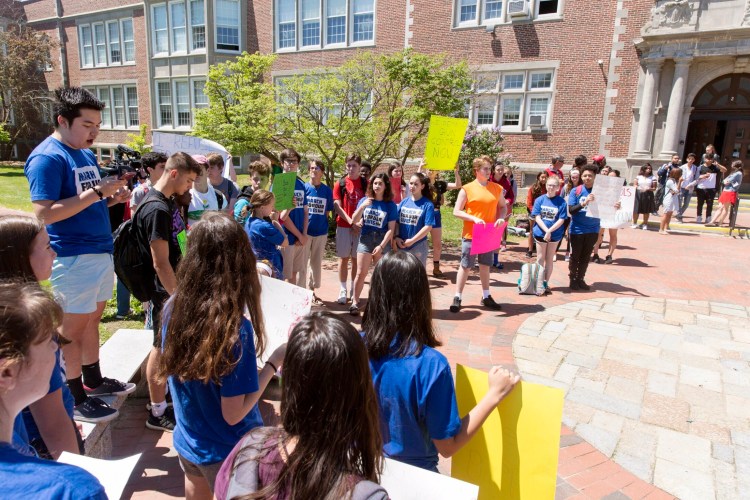About 50 students gathered outside Deering High School on Friday to rally in support of stricter gun control regulations.
For some of the students who held signs that read “Protect lives not guns” and “Fear has no place in school,” the demonstration marked their foray into political activism.

Students hold signs at a rally against gun violence at Deering High School on Friday. Brianna Soukup/Staff Photographer
The rally was organized by Deering’s March For Our Lives chapter, which is hoping to get more students involved amid an uptick in student-led political activism nationwide. Three students spoke against gun violence and the group held a moment of silence to honor the thousands of people nationally who have lost their lives to gun violence this year.
The event followed a visit earlier this week by David Hogg, a survivor of the Marjory Stoneman Douglas High School shooting in Parkland, Florida, last year and one of the founders of March For Our Lives.
Hogg spoke at the State House in Augusta with Maine students in support of gun-control legislation and visited with students at Casco Bay High School in Portland.
March For Our Lives started in 2018 – two months after the Parkland shooting – as a student-led march organized by Parkland victims to support gun violence prevention legislation in Washington D.C. The movement gained national attention when the march drew about 200,000 people and nearly 300,000 more in cities across the United States. After the march, the students, including Hogg, started the national organization and began to form chapters across the United States.
The first Maine chapter formed in February after Marlee Mellen, a 16-year-old sophomore at Casco Bay High School, was contacted by the March For Our Lives northeast director.
After agreeing to start a chapter in Maine, Mellen posted a request for participants on Instagram, and within two days, 200 high school students had expressed interest in starting chapters at their high schools.
“Everyone was just sharing and sharing and sharing. We were like trending in the circuit for a second, which was really cool,” Mellen said.

Marlena Hatem, 17, signs up Friday for Deering High’s March For Our Lives chapter after a rally in support of more gun regulation. Brianna Soukup/Staff Photographe
Less than four months later, March For Our Lives Maine has liaisons in 10 southern Maine high schools. Of those, four have active chapters, meaning students plan events and hold weekly meetings.
Deering High School is one of the most active chapters in Maine. Conrad Ngyuen, 17, the leader of the Deering chapter, believes there are several reasons why March for Our Lives has resonated among Deering students.
“I think with the recent political tensions, and ideas and violence that have erupted in the last decade, that that has caused the surge in activism,” he said.
While Deering students say the association with a national organization allows for a focused and dedicated mission, there are no guidelines for what individual chapters must accomplish. Quite the opposite. According to Ngyuen, March For Our Lives has encouraged each chapter to plan events based on what “is best for the community.”
For Deering’s March For Our Lives chapter, preventing gun violence is the priority, but not the only mission. Students are using March For Our Lives as a springboard for broader political activism at the school and in the community. In the fall, the chapter hopes to register voters in their school.

Deering High School freshman, Maddie Morrison, 14, center, and Emily Cheung, 14, right, participate in a rally organized by Deering’s March For Our Lives chapter. Brianna Soukup/Staff Photographer
One of the primary goals is to establish chapters throughout the state, including in high schools in rural, northern Maine.
Hogg’s visit to the State House added momentum to the high school groups. But, like Hogg and other national advocates, the Maine teenagers have felt backlash by those who worry about limits on the rights of gun owners.
While praised by many as a positive way for young people to speak out, critics have dismissed March For Our Lives as young people being manipulated by political forces that want to restrict gun rights.
Taking away people’s guns is “not what our agenda is in the slightest,” Mellen said. The goal is to build community around gun safety, she said.
“We feel like Portland already has such a strong community,” Mellen said. “And we can keep working towards this (goal) of a community that would speak up if someone was having a mental health issue.”
Student organizers said they do not believe that protesting against gun violence is a partisan issue.
“We’re trying to be bipartisan,” Ngyuen said. “We’re just trying to say that gun violence needs to be reduced. And the means of feasible options have to include regulations, but not necessarily taking away people’s guns.”
Mellen believes that the uptick in activism reflects her generation coming into political awareness in a polarized political time.
“We know that the future is ours because that’s what everyone keeps telling us,” Mellen said. “If this is our future, we have to change it.”
Send questions/comments to the editors.



Comments are no longer available on this story